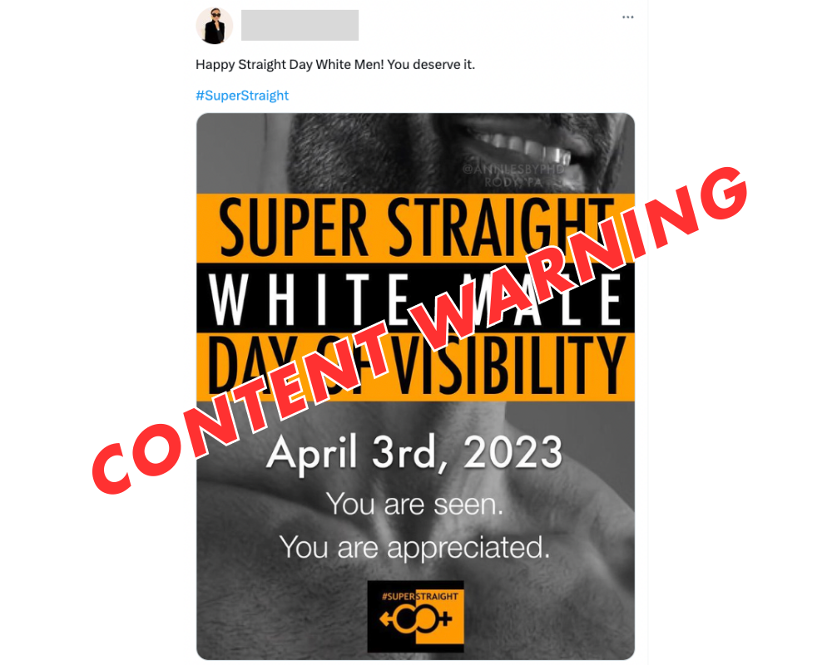Online Anti-LGBTQ Hate Terms Defined: “Super Straight”
This entry is part of the GLAAD Guide to Anti-LGBTQ Online Hate and Disinformation, an ongoing project to identify some of the most prevalent and egregious terms, tropes, and concepts that are used to harass, attack, and spread malicious misinformation about LGBTQ people on social media. Learn more here.
*CONTENT WARNING*
The example below includes a hateful term, phrases and imagery.
“Super Straight”

Launched to prominence in February 2021 by TikTok user Kyle Royce, this particular transphobic trope and corresponding hashtag was quickly taken up by anti-trans social media users. Disingenuously premised on a logical fallacy, the “Super Straight” meme offers a combination of whataboutism and false equivalency. A 2021 Them article offers context and a partial transcription of the video: “Royce said he had ‘made a new sexuality’ because he was tired of being called transphobic for not wanting to date trans women. ‘Now, I’m super straight,’ he continued. ‘I only date the opposite gender, women, that are born women. So you can’t say I’m transphobic now because that is just my sexuality.’” After it found popularity on TikTok, the “Super Straight” meme went viral on 4chan, a forum popular with members of the neo-Nazi movement, with many “Super Straight” posts including “logos or flags similar to the Nazi ‘SS,’” according to Snopes.
Here the speaker disingenuously asserts that this “identity” is a mere neutral (non-hateful) orientation, equivalent to LGBTQ identities and deserving of similar recognition and respect — and further, that the assertion is not an example of transphobia but simply an earnest expression of self. Like “Straight Pride” (and other hate-driven ideologies including “White Power”) these kinds of arguments are built on a feigned ignorance of real-world societal discrimination against marginalized groups and are a well-documented strategy of right-wing extremists for sowing discord and “trolling the Left“. Like the “LGBTP” campaign, “Super Straight” has continued to evolve as a vehicle for anti-trans and anti-LGBTQ conduct and content, including highjacking the #TransgenderDayofVisibility hashtag to troll and bury content by trans people and allies. In March 2021, Them reported that TikTok and Reddit have swiftly responded to the emergence of the trend. Reddit shut down the r/superstraight subreddit and TikTok deplatformed Royce and shadow-banned the hashtag. However, dozens of “Super Straight” accounts remain active across various platforms. This Insider piece offers further in-depth analysis. Explore more via GLAAD’s Guide to Anti-LGBTQ Online Hate and Disinformation.
Conclusion
This is just one example of anti-LGBTQ online hate and disinformation. Every term and concept should be evaluated in context. For instance, LGBTQ people and allies may use hashtags with hate terms as counterspeech, or slurs such as “tranny” or “dyke” may be used self-referentially to reclaim them. This guide will be updated on an ongoing basis. Please see the latest GLAAD Social Media Safety Index report for a deeper exploration of the current social media landscape for LGBTQ people, including GLAAD’s recommendations and thought leadership in the field.
How to Report Anti-LGBTQ Online Hate Speech and Harassment
Every major social media platform has policies which prohibit hate and harassment on the basis of protected characteristics, including sexual orientation and gender identity. To learn how to report potentially violative content, check out GLAAD’s LGBTQ Digital Safety Guide, which includes basic tips on helping our community be more safe online.
About the GLAAD Social Media Safety Program
As the leading national LGBTQ media advocacy organization, GLAAD is working every day to hold tech companies and social media platforms accountable and to secure safe online spaces for LGBTQ people. The GLAAD Social Media Safety Program produces the highly-respected annual Social Media Safety Index (SMSI) and researches, monitors, and reports on a variety of issues facing LGBTQ social media users — with a focus on safety, privacy, and expression.












